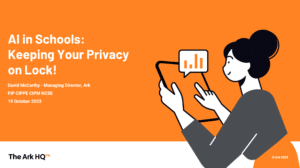Artificial Intelligence (AI) is becoming an increasingly prominent feature of our lives, and its application in education is gaining considerable importance.
Increasingly, “AI” is now being introduced by a wide range of software service providers to differentiate or stay ahead of their competition, from personalised learning aids to intelligent tutoring systems.
However, these AI systems’ extensive data collection and processing can lead to significant privacy concerns that school leaders should proactively address – because doing the right thing is always the right thing to do!
These AI systems, particularly those using machine learning algorithms, could unintentionally reveal sensitive information or pose less evident privacy risks.
Impact of AI on Student Learning and Teacher Efficiency
AI, no doubt, has the potential to revolutionise student learning and teacher efficiency. Personalised learning experiences can be created by analysing individual student data, including learning styles, strengths, and areas for improvement. Real-time feedback can be provided, and additional support can be offered to students with special needs.
On the other hand, teachers can benefit from reduced administrative tasks, insights into student performance, and the ability to focus on more critical aspects of teaching. However, with the benefits comes the responsibility of ensuring the privacy and security of the data being used.
Challenges Faced by Schools in Implementing AI
There is a potential risk associated with the insufficient understanding of how AI works and its implications. This lack of awareness may lead to uninformed decisions by staff, resulting in unintended consequences. There could also be misuse or over-reliance on AI systems without a full understanding of their limitations, leading to a risk of exposing or misusing data without proper knowledge of AI’s data handling.
The Importance of a School AI Policy
To address these concerns, there is a critical need for comprehensive policy and training on the AI components in use. Ensuring that the staff understands AI’s implications, limitations, and risks is essential. Your school AI policy and training should include regular updates and refresher courses to keep staff informed about the latest developments and best practices. Transparency and communication from leadership are also crucial. The staff should be fully aware of the School AI Policy and its implications.
Regular checks should ensure staff follows the school AI policy and a feedback loop for staff to report any concerns, issues, or suggestions related to AI usage. By implementing these strategies, schools can address the risks and responsibilities associated with staff’s potential lack of awareness about the AI components in the systems they use. This approach will also emphasise the importance of comprehensive training, transparent communication, and continuous monitoring and feedback.
The Intersection of AI and Data Privacy
The integration of AI in schools inevitably leads to an intersection between AI and data privacy. AI systems require a large amount of data to function optimally, and this data often includes sensitive information about students. At the same time, schools have a moral, ethical, and legal obligation to protect this data and ensure its privacy.
This intersection presents a unique set of challenges that need to be addressed in the School AI Policy:
Balancing Utility and Privacy
Balancing utility and privacy is a delicate act that schools must carefully navigate. As schools begin to rely more on AI technologies for various applications – from administrative tasks personalised learning experiences, to real-time monitoring of student performance – it is essential to recognise and address the challenges that come with it.
One of the key challenges is deciding what data to collect and use with these AI systems. Data is the fuel that powers AI systems. The more data an AI system has, the better it can learn, adapt, and provide personalised experiences. However, collecting vast amounts of data raises significant privacy concerns. Schools must make informed decisions about what types of data are necessary for the AI systems to function effectively and limit the data collection to only those categories. This is in line with the principle of data minimisation, which mandates that only data strictly necessary for the purpose at hand should be collected.
Another crucial aspect to consider is how the data will be stored and transmitted. Data security is of utmost importance, especially when it involves sensitive information of students and staff. Schools must invest in secure storage solutions and ensure encrypted data transmission. Additionally, schools need to establish clear protocols on who will have access to the data and under what circumstances. Access controls should be put in place to ensure that only authorised personnel can access the data.
Moreover, schools need to be transparent with all stakeholders – students, parents, and staff – about their data collection practices and how the AI systems will use the data. Clear and accessible privacy policies should be established, and stakeholders should obtain consent. Schools also need to establish mechanisms for stakeholders to access, correct, or delete their data.
Finally, schools must continuously monitor and assess their AI systems and data practices. Regular audits and assessments should be conducted to ensure compliance with privacy laws and regulations. Schools should also be proactive in identifying and addressing any potential privacy risks.
The Role of Stakeholders in School AI Policy
The development and implementation of a School AI Policy is not the sole responsibility of the school administration. Various stakeholders have a role to play in ensuring the success of the policy:
Teachers
Teachers are on the frontline of implementing AI in the classroom. They need to be trained on how to use the AI tools effectively and how to address any privacy concerns that may arise. Teachers also play a crucial role in monitoring the implementation of AI tools and providing feedback on their effectiveness.
Parents
Parents have a vested interest in ensuring the privacy and security of their children’s data. They need to be informed about the school’s AI policy and the measures being taken to protect their children’s data. Parents also have a role in providing feedback on the policy and its implementation.
Students
Students are the primary beneficiaries of the AI tools, and their feedback is essential for the success of the policy. Schools need to create avenues for students to provide feedback on the AI tools and their impact on their learning experience.
Developing a Comprehensive School AI Policy
A School AI Policy should be comprehensive, addressing the benefits and opportunities presented by AI and the potential risks and challenges. Here are some key components that should be included in a School AI Policy:
Clear Objectives
The policy should clearly outline the objectives of integrating AI into the school environment. These objectives could include enhancing personalised learning, streamlining administrative processes, or leveraging predictive analysis to improve student performance.
Data Privacy and Security
The policy should outline the measures that will be taken to ensure the privacy and security of the data used by the AI systems. This includes specifying who will have access to the data, how it will be stored and transmitted, and how long it will be retained.
Ethical Considerations
The policy should address the ethical considerations related to the use of AI in schools. This includes considerations related to plagiarism, bias / fairness and the potential impact on students’ development.
Training and Awareness
The policy should specify the training provided to teachers, administrators, and other staff members on the responsible use of AI in schools. It should also outline the measures that will be taken to raise awareness among students and parents about the benefits and potential risks of AI.

Monitoring and Evaluation
The policy should specify how the implementation of AI in schools will be monitored and evaluated. This includes specifying the metrics that will be used to measure success and the process for making any necessary adjustments to the policy or its implementation.
In summary
AI has the potential to revolutionise education, but it also brings significant privacy and security challenges. School leaders must proactively address these challenges to ensure that the benefits of AI are harnessed without compromising privacy.
Schools can create an environment of informed and responsible AI use by involving all stakeholders, implementing robust policy, privacy and security measures, and continuously monitoring and adjusting the implementation.













